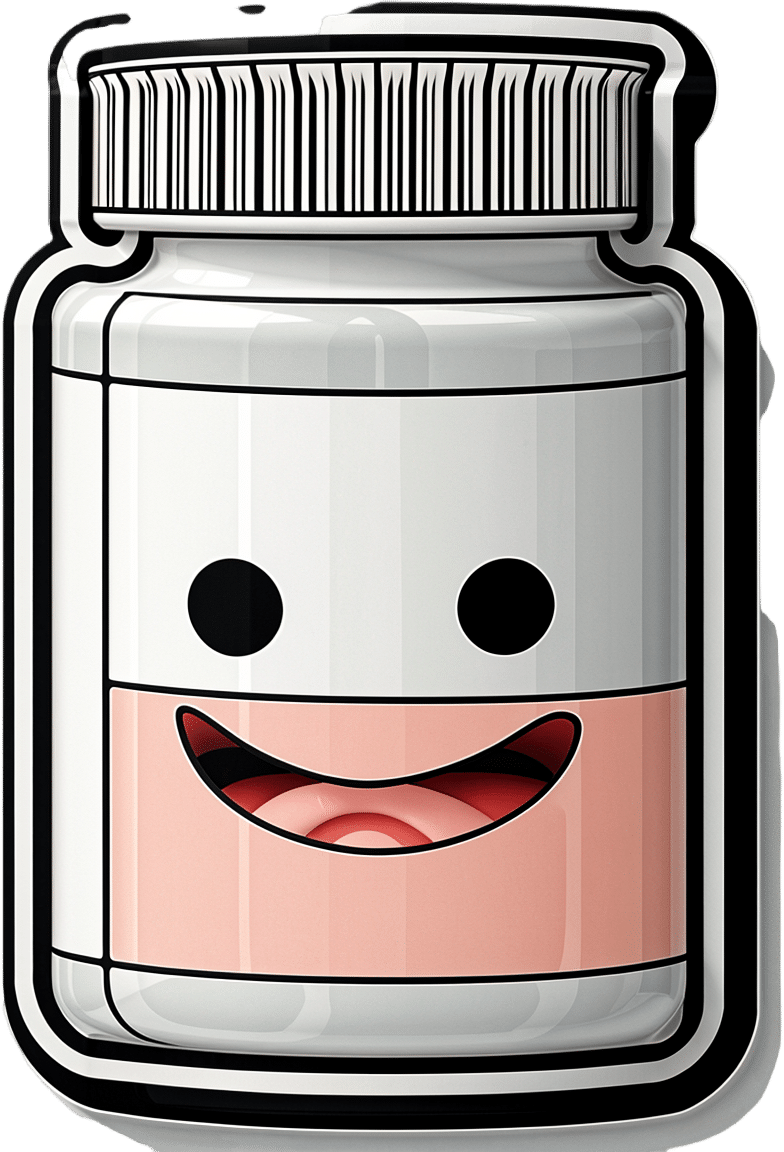
Glutathione: More Than An Antioxidant
10almonds is reader-supported. We may, at no cost to you, receive a portion of sales if you purchase a product through a link in this article.
Glutathione’s Benefits: The Usual And The Unique
Glutathione is a powerful antioxidant that does all the things we might reasonably expect an antioxidant to do, plus some beneficial quirks of its own.
We do make glutathione in our bodies, but we can also get it from our diet, and of course, we can also supplement it.
What foods is it in?
It’s in a lot of foods, but some top examples include:
- turmeric
- avocado
- asparagus
- almonds
- cruciferous vegetables
- watermelon
- garlic
For a fuller list and discussion, see:
What does it do?
Let’s start with the obvious; as with most things that are antioxidant, it is also anti-inflammatory. Increasing or decreasing glutathione levels is associated with decreased or increased inflammation, respectively. For example:
It being anti-inflammatory also means it can be beneficial in calming autoimmune disorders:
Glutathione: a key player in autoimmunity
And to complete the triad of “those three things that generally go together”, yes, this means it also has anticancer potential, but watch out!
❝Although in healthy cells [glutathione] is crucial for the removal and detoxification of carcinogens, elevated [glutathione] levels in tumor cells are associated with tumor progression and increased resistance to chemotherapeutic drugs❞
~ Dr. Miroslava Cuperlovic-Culf et al.
Read in full: Role of Glutathione in Cancer: From Mechanisms to Therapies
So in other words, when it comes to cancer risk management, glutathione is a great preventative, but the opposite of a cure.
What were those “beneficial quirks of its own”?
They are mainly twofold, and the first is that it improves insulin sensitivity. There are many studies showing this, but here’s a recent one from earlier this year:
The Role of Glutathione and Its Precursors in Type 2 Diabetes
The other main “beneficial quirk of its own” is that it helps prevent and/or reverse non-alcoholic fatty liver disease, as in this study from last year:
Because of glutathione’s presence in nuts, fruits, and vegetables, this makes it a great thing to work in tandem with a dietary approach to preventing/reversing NAFLD, by the way:
Anything else?
It’s being investigated as a potential treatment for Parkinson’s disease symptoms, but the science is young for this one, so there is no definitive recommendation yet in this case. If you’re interested in that, though, do check out the current state of the science at:
Potential use of glutathione as a treatment for Parkinson’s disease
Is it safe?
While there is no 100% blanket statement of safety that can ever be made about anything (even water can kill people, and oxygen ultimately kills everyone that something else doesn’t get first), glutathione has one of the safest general safety profiles possible, with the exception we noted earlier (if you have cancer, it is probably better to skip this one unless an oncologist or similar advises you otherwise).
As ever, do speak with your doctor/pharmacist to be sure in any case, though!
Want to try some?
We don’t sell it, but here for your convenience is an example product on Amazon 😎
Enjoy!
Don’t Forget…
Did you arrive here from our newsletter? Don’t forget to return to the email to continue learning!
Recommended
Learn to Age Gracefully
Join the 98k+ American women taking control of their health & aging with our 100% free (and fun!) daily emails:
-
What does lion’s mane mushroom actually do, anyway?
10almonds is reader-supported. We may, at no cost to you, receive a portion of sales if you purchase a product through a link in this article.
You may know it as an ingredient in nootropic supplements. You may have heard of lion’s mane mushroom coffee. You may know it as the big shaggy white mushroom that grows in nature and can look very impressive.
What’s special about it?
The lion’s mane mushroom, or Hericium erinaceus (we mention, as studies we’ll cite often use the botanical name) is an adaptogenic agent that has an established ability to promote nerve regeneration through nerve growth factor neurotrophic activity. In other words, it helps (re)grow neurons.
In a 2023 study, researchers wondered if its abilities (well-established in the peripheral nervous system) would work in the central nervous system too, namely the brain, specifically the hippocampus (responsible for memory).
To boil what they found down to a single line, they concluded:
❝[Lion’s mane extract] therefore acts through a novel pan-neurotrophic signaling pathway, leading to improved cognitive performance.❞
You can read the full study for yourself (with pictures!) here:
Limitations of the study
It’s worth noting that the above study was performed on mice brains, not those of humans. As there is a shortage of human volunteers willing to have their brains sliced and examined under microscopes, we do not expect this study to be repeated with humans any time soon.
So, are there human studies that have been done?
There are! Particularly promising was this 2020 study of people with Alzheimer’s disease, wherein supplementation with 1g of lion’s mane mushroom daily for 49 weeks significantly increased cognitive test scores compared with a placebo; you can read about it here:
Additionally, this 2019 study showed that taking 1.2g daily for eight weeks helped relieve depression, anxiety, and sleep disorders in overweight or obese patiences:
Are there other health benefits?
It seems so! Unfortunately, most of its other health claims are only supported by animal studies so far, aside from one small study funded by a supplement company for their supplement that contained mostly Agaricus blazei (a different mushroom) with 14% lion’s mane.
However, in animal studies, lion’s mane has also shown promise:
- For digestion
- Against inflammation
- For cardiovascular health
- For diabetes management
- Against cancer
- Against aging
Where can I get it?
We don’t sell it (or anything else, for that matter) but if you’d like to try it, here’s an example product for your convenience:
Share This Post
-
How & Why Non-Sleep Deep Rest Works (And What Activities Trigger The Same State)
10almonds is reader-supported. We may, at no cost to you, receive a portion of sales if you purchase a product through a link in this article.
Stress is a natural response that evolved over thousands of years to help humans meet challenges by priming the body and mind for action. However, chronic stress is harmful, as it diverts energy away from essential processes like cell maintenance and repair, leading to deterioration of health (physical and mental).
Counteracting this requires intentional periods of deep rest… But how?
Parasympathetic Response
Practices as diverse as mindfulness meditation, yoga, prayer, tai chi, qigong, knitting, painting, gardening, and sound baths can help induce states of deep rest—these days often called “Non-Sleep Deep Rest” (NSDR), to differentiate it from deep sleep.
How it works: these activities send signals to the brain that the body is safe, initiating biological changes that…
- protect chromosomes from DNA damage
- promote cellular repair, and
- enhance mitochondrial function.
If we then (reasonably!) conclude from this: “so, we must embrace moments of stillness and mindfulness, and allow ourselves to experience the ease and safety of the present”, that may sound a little wishy-washy, but the neurology of it is clear, the consequences of that neurological response on every living cell in the body are also clear, so by doing NSDR (whether by yoga nidra or knitting or something else) we can significantly improve our overall well-being.
Note: the list of activities above is far from exhaustive, but do be aware that this doesn‘t mean any activity you enjoy and do to unwind will trigger NSDR. On the contrary, many activities you enjoy and do to unwind may trigger the opposite, a sympathetic nervous system response—watching television is a common example of this “wrong choice for NSDR”. Sure, it can be absorbing and a distraction from your daily stressors, but it also can be exciting (both cognitively and neurologically and thus also physiologically), which is the opposite of what we want.
For more on all of this, enjoy:
Click Here If The Embedded Video Doesn’t Load Automatically!
Want to learn more?
You might also like to read:
Non-Sleep Deep Rest: A Neurobiologist’s Take
Take care!
Share This Post
-
What’s So Special About Alpha-Lipoic Acid?
10almonds is reader-supported. We may, at no cost to you, receive a portion of sales if you purchase a product through a link in this article.
The Access-All-Areas Antioxidant
Alpha-Lipoic Acid (ALA) is one of the most bioavailable antioxidants in existence. A bold claim, but most antioxidants are only water-soluble or fat-soluble, whereas ALA is both. This has far-reaching implications—and we mean that literally, because its “go everywhere” status means that it can access (and operate in) all living cells of the human body.
We make it inside our body, and we can also get it in our diet, or take it as a supplement.
What foods contain it?
The richest food sources are:
- For the meat-eaters: organ meats
- For everyone: broccoli, tomatoes, & spinach
However, supplements are more efficient at delivering it, by several orders of magnitude:
Read more: Lipoic acid – biological activity and therapeutic potential
What are its benefits?
Most of its benefits are the usual benefits you would expect from any antioxidant, just, more of it. In particular, reduced inflammation and slowed skin aging are common reasons that people take ALA as a supplement.
Does it really reduce inflammation?
Yes, it does. This one’s not at all controversial, as this systematic review of studies shows:
(C-reactive protein is a marker of inflammation)
Does it really reduce skin aging?
Again yes—which again is not surprising for such a potent antioxidant; remember that oxidative stress is one of the main agonists of cellular aging:
As a special feature, ALA shows particular strength against sun-related skin aging, because of how it protects against UV radiation and increases levels of gluthianone, which also helps:
- Photochemical stability of lipoic acid and its impact on skin ageing
- Modern approach to topical treatment of aging skin
Where can I get some?
We don’t sell it, but here for your convenience is an example product on Amazon
Enjoy!
Share This Post
Related Posts
-
Aging Well: Exercise, Diet, Relationships
10almonds is reader-supported. We may, at no cost to you, receive a portion of sales if you purchase a product through a link in this article.
Questions and Answers at 10almonds
Have a question or a request? You can always hit “reply” to any of our emails, or use the feedback widget at the bottom!
This newsletter has been growing a lot lately, and so have the questions/requests, and we love that! In cases where we’ve already covered something, we might link to what we wrote before, but will always be happy to revisit any of our topics again in the future too—there’s always more to say!
As ever: if the question/request can be answered briefly, we’ll do it here in our Q&A Thursday edition. If not, we’ll make a main feature of it shortly afterwards!
So, no question/request too big or small
I am interested in the following: Aging, Exercise, Diet, Relationships, Purpose, Lowering Stress
You’re going to love our Psychology Sunday editions of 10almonds!
You may particularly like some of these:
- Seriously Useful Communication Skills! ← this is about relationship stuff
- Lower Your Cortisol! (Here’s Why & How) ← about “the stress hormone”
- How To Set Your Anxiety Aside ← these methods work for stress too
(This coming Psychology Sunday will have a feature specifically on stress, so do make sure to read that when it comes out!)
Don’t Forget…
Did you arrive here from our newsletter? Don’t forget to return to the email to continue learning!
Learn to Age Gracefully
Join the 98k+ American women taking control of their health & aging with our 100% free (and fun!) daily emails:
-
The 5 Love Languages Gone Wrong
10almonds is reader-supported. We may, at no cost to you, receive a portion of sales if you purchase a product through a link in this article.
Levelling up the 5 love languages
The saying “happy wife; happy life” certainly goes regardless of gender, and if we’re partnered, it’s difficult to thrive in our individual lives if we’re not thriving as a couple. So, with the usual note that mental health is also just health, let’s take a look at getting beyond the basics of a well-known, often clumsily-applied model:
The 5 love languages
You’re probably familiar with “the 5 love languages”, as developed by Dr. Gary Chapman. If not, they are:
- Acts of Service
- Gift-Giving
- Physical Touch
- Quality Time
- Words of Affirmation
The idea is that we each weight these differently, and problems can arise when a couple are “speaking a different language”.
So, is this a basic compatibility test?
It doesn’t have to be!
We can, if we’re aware of each other’s primary love languages, make an effort to do a thing we wouldn’t necessarily do automatically, to ensure they’re loved the way they need to be.
But…
What a lot of people overlook is that we can also have different primary love languages for giving and for receiving. And, missing that can mean that even taking each other’s primarily love languages into account, efforts to make a partner feel loved, or to feel loved oneself, can miss 50% of the time.
For example, I (your writer here today, hi) could be asked my primary love language and respond without hesitation “Acts of Service!” because that’s my go-to for expressing love.
I’m the person who’ll run around bringing drinks, do all the housework, and without being indelicate, will tend towards giving in the bedroom. But…
A partner trying to act on that information to make me feel loved by giving Acts of Service would be doomed to catastrophic failure, because my knee-jerk reaction would be “No, here, let me do that for you!”
So it’s important for partners to ask each other…
- Not: “what’s your primary love language?” ❌
- But: “what’s your primary way of expressing love?” ✅
- And: “which love language makes you feel most loved?” ✅
For what it’s worth, I thrive on Words of Affirmation, so thanks again to everyone who leaves kind feedback on our articles! It lets me know I provided a good Act of Service
So far, so simple, right? You and your partner (or: other person! Because as we’ve just seen, these go for all kinds of dynamics, not just romantic partnerships) need to be aware of each other’s preferred love languages for giving and receiving.
But…
There’s another pitfall that many fall into, and that’s assuming that the other person has the same idea about what a given love language means, when there’s more to clarify.
For example:
- Acts of Service: is it more important that the service be useful, or that it took effort?
- Gift-Giving: is it better that a gift be more expensive, or more thoughtful and personal?
- Physical Touch: what counts here? If we’re shoulder-to-shoulder on the couch, is that physical touch or is something more active needed?
- Quality Time: does it count if we’re both doing our own thing but together in the same room, comfortable in silence together? Or does it need to be a more active and involved activity together? And is it quality time if we’re at a social event together, or does it need to be just us?
- Words of Affirmation: what, exactly, do we need to hear? For romantic partners, “I love you” can often be important, but is there something else we need to hear? Perhaps a “because…”, or perhaps a “so much that…”, or perhaps something else entirely? Does it no longer count if we have to put the words in our partner’s mouth, or is that just good two-way communication?
Bottom line:
There’s a lot more to this than a “What’s your love language?” click-through quiz, but with a little application and good communication, this model can really resolve a lot of would-be problems that can grow from feeling unappreciated or such. And, the same principles go just the same for friends and others as they do for romantic partners.
In short, it’s one of the keys to good interpersonal relationships in general—something critical for our overall well-being!
Don’t Forget…
Did you arrive here from our newsletter? Don’t forget to return to the email to continue learning!
Learn to Age Gracefully
Join the 98k+ American women taking control of their health & aging with our 100% free (and fun!) daily emails:
-
The Smartest Way To Get To 20% Body Fat (Or 10% For Men)
10almonds is reader-supported. We may, at no cost to you, receive a portion of sales if you purchase a product through a link in this article.
20% body fat for women, or 10% for men, are suggested in this video as ideal levels of adiposity for most people. While we certainly do have wiggle-room in either direction, going much higher than that can create a metabolic strain, and going much lower than that can cause immune dysfunction, organ damage, brittle bones, and more.
This video assumes you want to get down to those figures. If you want to go up to those figures because you are currently underweight, check out: How To Gain Weight (Healthily!)
Look at the small picture
The main trick, we are told, is to focus on small, incremental changes rather than obsessing over long-term weight loss goals (e.g. 20% body fat for women, 10% for men).
Next, throw out what science shows doesn’t work, such as restrictive or extreme dieting:
- Restrictive dieting doesn’t work as the body will try to save you from starvation by storing extra fat and slowing your metabolism to make your fat reserves last longer
- Extreme dieting doesn’t work because no matter how compelling it is to believe “I’ll just lose it in this extreme way, then maintain my new lower weight”, the vast body of research shows that weight loss in this way will be regained quickly afterwards, and for a significant minority, may even end up putting more back on than was originally lost. In either case, you’ll have put your mind and body through the wringer for no long-term gain.
The recommendation comes in three parts:
- Shift your mindset: detach motivation from timelines and vanity goals; focus instead on lifelong health and sustainable habits.
- Use an analytical approach: apply engineering principles: collect honest data and identify bottlenecks. Track food intake consistently, even during slip-ups, to identify areas for improvement. You remember the whole “it doesn’t count if it’s from someone else’s plate” thing? These days with food trackers, a lot of people fall into “it doesn’t count if I don’t record it”, but a head-in-the-sand approach will not get you where you want to be.
- Tackle bottlenecks incrementally: focus on one small, impactful change at a time (e.g. reducing soda intake). This way, you can build habits gradually to prevent willpower burnout and sustain your progress.
As an example of how this looked for Viva (in the video):
- > 30% body fat stage: she focused on reducing processed foods and portion sizes.
- 29–25% body fat stage: she prioritized nutrient-dense foods and reduced dining out.
- 24–20% body fat stage: she added strength training, improved sleep, and addressed her cravings and energy levels.
In short: look at the small picture; adjust your habits mindfully, keep a track of things, see what needs improvement and improve it, and don’t try to speedrun weight loss; just focus on what you are tangibly doing to keep things heading in the right direction, and you’ll get there 1% at a time.
For more on all of this, enjoy:
Click Here If The Embedded Video Doesn’t Load Automatically!
Want to learn more?
You might also like to read:
Lose Weight, But Healthily ← our own guide, which is also consistent with the advice above, and talks about some specific things to pay attention to that weren’t mentioned in the video
Take care!
Don’t Forget…
Did you arrive here from our newsletter? Don’t forget to return to the email to continue learning!
Learn to Age Gracefully
Join the 98k+ American women taking control of their health & aging with our 100% free (and fun!) daily emails:







